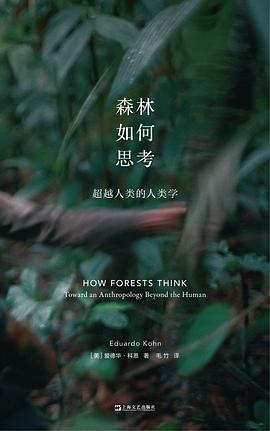WULOLIFE
《森林如何思考:超越人类的人类学》作者: [加]爱德华多·科恩(Eduardo Kohn)一周热门非虚构类图书
《森林如何思考:超越人类的人类学》作者: [加]爱德华多·科恩(Eduardo Kohn)一周热门非虚构类图书
Couldn't load pickup availability
Description
内容简介· · · · · ·
森林会思考吗?狗会做梦吗?这本书试图讲述的正是人类之外的生物如何创造了开辟新世界的可能性,更是体现了人类学向本体论和去人类中心化的趋势。他的课题涉及到对人类学和 “人类”的根本反思,以便我们能够学会“生态化 ”我们的伦理。科恩的理论建立在符号学和语言学的基础上,而在厄瓜多尔的阿维拉,他通过一种民族志的手段深入考察了鲁纳人的生存方式,并他们是怎样将他们自己与他们所处的这个世界上最茂密的森林中乃至是树和他在书中挑战了人类学的基本理论,即何为人类、人类又如何区别于其他非人类生物的设定。而这种分野,也让作者拥有了新的人类学研究工具。力图颠覆人类语言在探索外部世界中的作用。
《森林如何思考》获得了2014年格雷戈里-贝特森人类学最佳图书奖。这本书以令人惊讶的方式激发了地球生态的想象力,其衍生作品不仅包括在还有国际博物馆展览,以及畅销的小说和非小说作品。该书受到了人类学和环境人文科学领域领先学者的热烈欢迎和认可。
※重塑了我固定的解释习惯”。
。
※ 罗安清认为这本书将“引发人类学之内和人类学之上的重要对话”。
※ 玛丽莲·斯特拉瑟恩称其为“最具创造性的思想跳跃”。
※的一个显著特点是它的复杂— —微妙的理论命题与更微妙的民族志的交融。”
※世界报将其描述为:“人类学学科的真正反思......一个代表作......令人赞叹,而且已然经典化了”。
※泰晤士报文学副刊则评价道:“科恩......以完美的平衡走着钢丝:从不忽视。
作者简介· · · · · ·
爱德华多·科恩(Eduardo Kohn, 2014他的最新项目“树木的森林 ”,森林如何思考》的基础上,论证了森林——的非人类符号学的巨大网络的新兴产品— —是一个真实的东西,而不仅仅是一个人类的抽象概念。
译者:
毛竹,北京大学哲学系博士,比利时鲁汶大学访问学者,中国社会科学院哲学研究所博士后,合作导师为叶秀山研究员。2016年进入中国社会科学院哲学研究所工作。研究领域为现象学和近代哲学,同时从事当代艺术研究和艺术评论。
